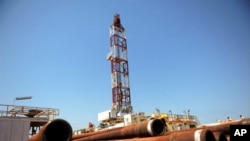As south Sudan prepares for independence following the referendum in January, its leaders are counting on oil revenues to fund reconstruction and ignite economic growth. But the fact that the revenues fund more than 95 percent of the government budget and must be divided with northern Sudan creates a challenge.
Decades of war prevented the exploitation of most of Sudan’s six billion barrels of known petroleum reserves.
But since a peace accord six years ago, Sudan has become the third largest oil exporter in Africa, after Angola and Nigeria. It now produces nearly half a million barrels per day.
When southern Sudan becomes independent on July 9 it will also become one of the least-developed countries in Africa, a legacy of years of war and neglect by the government in Khartoum.
The southern Sudanese Energy Minister, Garang Diing Akuong, says the oil revenues will be needed to build roads, schools and hospitals.
"Our people will have a lot of expectations as independence takes place in July. And we want to match that expectation with the provision of a lot of goods and services. Oil will be used as an engine for the growth of other sectors that will transform the economy of the south," he said.
Watch related video report
Three-fourths of the oil fields are in southern Sudan but the refineries and pipeline to the sea are in the north. Sensitive negotiations are underway on how to divide revenues from the resource.
There is talk of building a pipeline from southern Sudan eastward to a Kenyan port at Lamu. But experts say new oil reserves must be found to justify its $4 billion price tag.
Environmental groups say currently Sudan’s National Petroleum Corporation and its partners from China, India and Malaysia are not doing enough to protect the environment. They say water-borne oil residue from pumping operations is being stored in unprotected pits and is contaminating local water supplies.
Southern Sudanese leaders say they are aware of the charges but are under-funded and under-equipped to monitor the industry. They would like Western oil companies which are monitored by well-established environmental groups to enter the picture.
But Western oil companies currently cannot invest in Sudan because of economic sanctions against the Khartoum government.
Western governments say they will lift the sanctions if south Sudan's separation moves ahead peacefully. But U.S. Consul-General Barrie Walkley warns that this could take some time.
"There is not one single statute which governs the sanctions. There are many different statutes in many different areas in many different laws. And each one of these will have to be repealed in order for the sanctions to be repealed in total," said Walkley.
He warns that the oil will run out one day and recommends investing now in other sectors.
Energy Minister Akuong agrees but says the development of other sectors, such as agriculture and trade, will take time. He notes that southern Sudan also has other minerals such as gold, copper and iron ore.
"This region is very [well] endowed with minerals. We are going to survey this area in the near future to see the deposits in terms of minerals that we have in this area. And then we will invite investors to come and invest in this area," said Akuong.
He says his government wants investors from Africa, Europe and the Americas to participate.
But he acknowledges that oil is likely to play a dominant role in southern Sudan’s economy for years to come.




